News 6/24/14
Top News

HHS Secretary Sylvia Burwell announces several management changes, including the appointment of Andy Slavitt (Optum) as CMS principal deputy administrator. Slavitt certainly fits the bill, as Optum helped fix Healthcare.gov after its disastrous rollout. Burwell also intends to hire a Healthcare.gov CEO and CTO in time to better handle the marketplace’s next open-enrollment period in November. Burwell was quicker than her colleague, National Coordinator Karen DeSalvo, MD to usher in leadership changes. DeSalvo took nearly six months to reshuffle ONC personnel while Burwell took just two weeks.
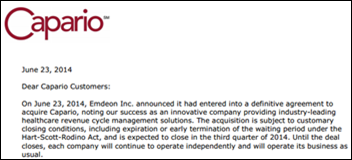
Emdeon announces it will acquire healthcare technology company Capario for $115 million in cash. The acquisition will enable Emdeon to offer the CaparioOne revenue cycle management platform to its Intelligent Healthcare Network, which reaches 700,000 physicians and 600 hospitals, among other entities. Each company will continue to operate independently until the deal closes in the third quarter of 2014.
HIStalk Practice Announcements and Requests
Thanks to Mr. H for the kind introduction last week. It’s nice to get back to my journalism roots, covering an industry that shows no signs of slowing down in its attempts to achieve the triple aim. Coincidentally, HIStalk launched 11 years ago, just about the time (give or take a year) I graduated from journalism school.

This particular edition of HIStalk Practice comes to you from the home of the Blue Angels, as well as Baptist Health Care and its five-year-old network of Baptist Medical Group physicians, both of which use NextGen’s EHR and practice management solutions. I had the pleasure of meeting Baptist CIO Steve Sarros at an iHT2 Summit earlier this year, and he was kind enough to fill me in on the Blues’ practice and performance schedule.
Speaking of CIOs, The CIO’s Role in Consumer Health (7/2) is just one of the webinars HIStalk has scheduled in the coming weeks. Additional presentations include Cloud is Not (Always) the Answer (6/25), and the Role of Identity Management in Protecting Patient Health Information (6/26).
Acquisitions, Funding, Business, and Stock

Physician-led Arizona Priority Care and Walgreens enter into a care collaboration agreement whereby Walgreens will provide coordinated, expanded services for AzPC Medicare Advantage and ACO members. Services will include medication management, health risk assessments and testing, immunizations, and patient education and wellness services. This arrangement makes me wonder if Farzad Mostashari’s new venture for independent physicians will seek out retail clinics as potential ACO partners.
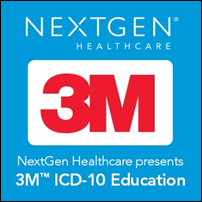
NextGen offers 3M’s online ICD-10 Education Program. The subscription service comprises 22 training modules based on medical specialty that include self-assessments, practice questions, tests, and progress and completion reports.
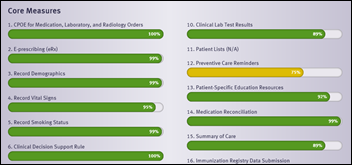
Athenahealth announces that its users account for 59 percent of the 485 providers who have attested for Stage 2 of Meaningful Use, even though its market share is less than 3 percent. The company seems to have taken its recent stock drubbing in stride. As a recent Forbes article says on the subject, “Maybe it helps to say cloud.”
Announcements and Implementations

The local paper announces the creation of the Great Lakes Health Connect HIE. Formed through the merger of the Great Lakes HIE in East Lansing and Michigan Health Connect in Grand Rapids, the new HIE will cover 80 percent of the state’s total licensed beds with 120 member hospitals, 20,000 physicians, and 3,000 clinics and offices. Great Lakes Health Connect will have a consolidated revenue of $8 million, though no mention has been made of how it will continue to generate that kind of money. It’s an interesting twist on the evolving sustainability saga surrounding HIEs, not to mention another example of the greater healthcare market consolidation trend that shows no signs of slowing down.

Wilmington Health (NC) officials prepare to switch from a 10-year-old Allscripts EHR to a NextGen solution in an effort to “enhance coordination of patient care between providers, securely store patient information, and manage population health,” among other benefits. The 70-physician, multi-specialty practice has been working on the EHR conversion for the past 18 months, and expects to go live by July 1.
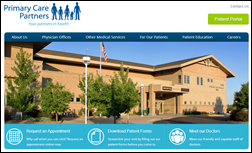
Primary Care Partners (CO) and St. Mary’s Hospital and Regional Medical Center (CO and UT) announce plans to form a clinically integrated network that will enable them to care for patients collaboratively while remaining separate business entities. The arrangement is contingent on a number of factors, including the establishment of “computer connectivity.” Navigant Consulting has been tapped to guide the organizations through CIN development, the first phase of which is expected to take six months. It will be interesting to see how they fare in establishing some type of connectivity, given that St. Mary’s is on Epic and PCP is on Allscripts.
Government and Politics
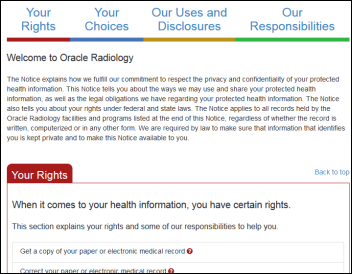
ONC will present a webinar on Thursday, June 27 at 1:00 ET on how to implement digital privacy notices on websites. PatientPrivilege won ONC’s contest to create compelling, easy to implement online NPPs – its example shows how one might look.

In other ONC news, the office announces that the Blue Button consumer campaign will launch this fall, with public service announcements scheduled to run between September 15 and October 6 (conveniently coinciding with National Health IT Week). Eleven organizations have committed to running PSAs in an effort to educate the public about the importance of being able to access their health data. Lygeia Ricciardi, director of ONC’s office of consumer eHealth, alluded to this campaign at a brief Blue Button session at HIMSS 14, during which she likened it to the Energy Star brand so many of us are now familiar with.
Research and Innovation

A new study shows that practices in Nashville, TN are on par with the national average when it comes to EHR adoption. Seventy-four percent of the area’s practices have implemented solutions from four of the nation’s top five vendors including eClinicalWorks, Practice Fusion, NextGen, and Allscripts. The town bucks the trend when it comes to national favorite Epic, which Nashville providers have shied away from thus far due to a “reputation for high costs.”

The Institute for Alternative Futures publishes a report that offers scenarios, recommendations, and strategies for the future of public health. The scenario of “Community-Driven Health and Equity” peaks my interest the most. Futurists predict that public health agencies, partners, and local health improvement initiatives come together via technology and social media to form a national web of health-enhancing networks, which will help communities exchange innovations and best practices, and leverage the expertise of public health agencies.
Other

Ted Roberto, DPM, of New Jersey Foot and Ankle Specialists, tells the local paper that transitioning to an EHR has been a “constant struggle and a huge stress,” especially for older physicians who have been paper-based for decades. Roberto, who championed the transition to an EHR at a previous practice, now finds himself documenting in the EHR at home for a few hours each night so as to maximize time with patients each day. He is toying with the idea of hiring a scribe despite the added cost.

datascience@berkley publishes an infographic showing the difference between EMRs and EHRs, which states and practices have adopted electronic systems, and what the future of the digital health industry looks like. Interestingly enough, New Jersey is in the bottom five states when it comes to EHR adoption.
Sponsor Updates
- Kareo offers medical practices a guide for registering for the VA’s “Accelerating Access to Care Initiative,” which allows them to serve VA patients who can’t get appointments for primary or specialty care.
- PerfectServe announces new webinars as part of its thought leadership webinar series.
- Aprima offers dashboardMD’s performance management and BI reporting tools in a browser-agnostic and mobile-friendly suite of solutions.
Contacts
Mr. H, Lorre, Jennifer, Dr. Jayne, Dr. Gregg, Lt. Dan, Dr. Travis
More news: HIStalk, HIStalk Connect.
Get HIStalk Practice updates.
Contact us online.






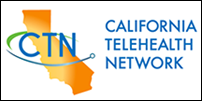



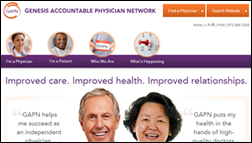
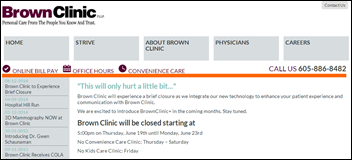

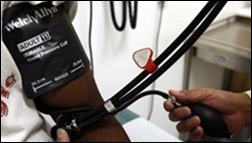
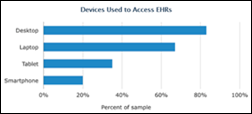
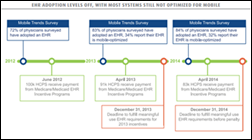



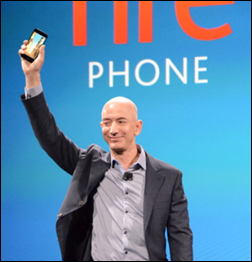












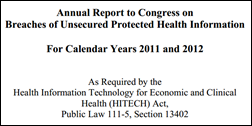
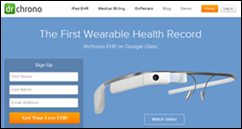
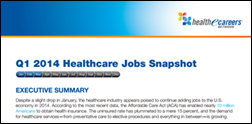


The article about Pediatric Associates in CA has a nugget with a potentially outsized impact: the implication that VFC vaccines…